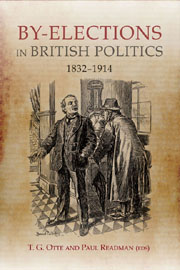Book contents
- Frontmatter
- Contents
- List of Figures and Tables
- List of Contributors
- Preface and Acknowledgements
- List of Abbreviations
- Introduction
- 1 ‘Plumping Contests’: The Impact of By-elections on English Voting Behaviour, 1790–1868
- 2 Government Appointment By-elections: 1832–86
- 3 ‘We should have had 1,000’: The By-elections of the 1874 Parliament
- 4 ‘The Glamour of Independence’: By-elections and Radicalism during the Liberal Meridian, 1869–83
- 5 ‘The Swing of the Pendulum at Home’: By-elections and Foreign Policy, 1865–1914
- 6 By-elections and the Modernisation of Party Organisation, 1867–1914
- 7 ‘A Terrific Outburst of Political Meteorology’: By-elections and the Unionist Electoral Ascendancy in Late-Victorian England
- 8 Land Reform and By-elections, 1885–1914: Do By-elections Matter?
- 9 Edwardian By-elections
- 10 Lloyd George, Limehouse and the Realignment of British Politics: The Bermondsey By-election of 1909
- 11 By-elections and the Peculiarities of Scottish Politics, 1832–1900
- Index of By-election Contests
- General Index
3 - ‘We should have had 1,000’: The By-elections of the 1874 Parliament
Published online by Cambridge University Press: 05 May 2013
- Frontmatter
- Contents
- List of Figures and Tables
- List of Contributors
- Preface and Acknowledgements
- List of Abbreviations
- Introduction
- 1 ‘Plumping Contests’: The Impact of By-elections on English Voting Behaviour, 1790–1868
- 2 Government Appointment By-elections: 1832–86
- 3 ‘We should have had 1,000’: The By-elections of the 1874 Parliament
- 4 ‘The Glamour of Independence’: By-elections and Radicalism during the Liberal Meridian, 1869–83
- 5 ‘The Swing of the Pendulum at Home’: By-elections and Foreign Policy, 1865–1914
- 6 By-elections and the Modernisation of Party Organisation, 1867–1914
- 7 ‘A Terrific Outburst of Political Meteorology’: By-elections and the Unionist Electoral Ascendancy in Late-Victorian England
- 8 Land Reform and By-elections, 1885–1914: Do By-elections Matter?
- 9 Edwardian By-elections
- 10 Lloyd George, Limehouse and the Realignment of British Politics: The Bermondsey By-election of 1909
- 11 By-elections and the Peculiarities of Scottish Politics, 1832–1900
- Index of By-election Contests
- General Index
Summary
The by-elections of the 1874-80 parliament, that of the Conservative administration led by Benjamin Disraeli, have usually attracted attention for only one reason: their part in its dissolution. As David Butler has noted: ‘It was thought, probably incorrectly, that the deceptively favourable outcome of contests at Southwark and Sheffield in February 1880 lured Disraeli into announcing the general election which ended his rule.’ So far into obscurity have the by-elections of that period disappeared that even the contests in question seem to have been forgotten: it was a Conservative ‘hold’ in Liverpool and a Conservative gain in Southwark in February 1880 that may have helped precipitate the dissolution (following a surprisingly narrow Liberal victory in Sheffield a few months earlier). The only other by-election of note in the historiography of that parliament, is that in Buckinghamshire, Disraeli's own seat, which the Conservatives almost lost when the prime minister vacated it in 1876 to take up his place in the Lords as the Earl of Beaconsfield (though for clarity he is here referred to as Disraeli throughout). Yet even that contest has received only the briefest consideration, not primarily as an election, but as the opportunity for a provocative Disraelian speech.
It is, however, a parliament which has attracted a great deal of attention for the popular politics that accompanied its deliberations. The striking development of this period, for contemporaries and historians alike, was the mass agitation that began in the summer of 1876, in the wake of reported massacres of Christians committed by the Turks in the Balkans.
- Type
- Chapter
- Information
- By-Elections in British Politics, 1832-1914 , pp. 77 - 98Publisher: Boydell & BrewerPrint publication year: 2013

